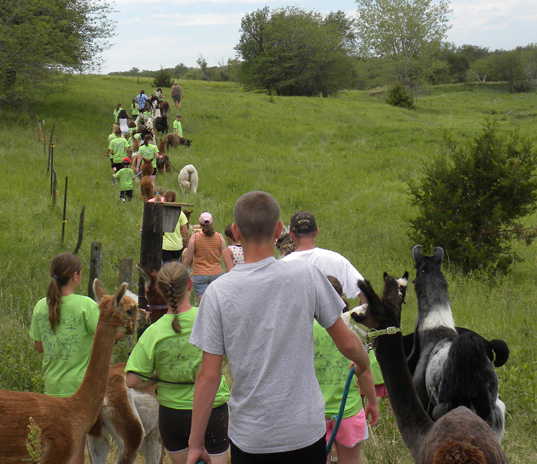The Importance of Mentors

The Importance of Mentors
By John Fant, Howling Moon Farm
I am not a professional writer by any means, but I like to write. I am going to start a series of articles about what I have seen and learned in the upcoming issues about llamas. For many of you it has been years since you have been in my shoes. I am going to tell the good and bad, the victories and failures. So please just stay with our journey. Here is my introductory article, so enjoy!
You may not think mentoring is important, but to a newcomer into the llama industry, it is! My wife and I started a few years back talking about buying a llama to guard our hair sheep. We watch them go through the stockyard off and on. We never really were trying to learn anything about them. We just listened to what the owners who were selling the llamas would say. (We all know this—the quick-sale pitch!) At that time, that is all we knew about llamas. Oh yeah, that they spit! We actually watched the livestock handlers at a local auction get spit on!
Then in June 2014, I found out about a wonderful couple that were needing to get out of the llama industry or llama love (there is a difference) due to health reasons. I was shocked that they interviewed me and asked a lot of serious questions. I remembered doing the same thing when we were selling our wolf pups. Then I was asked the famous fifty-cent question “What were we going to do with them?” Originally, we were just going to use them as pets and guards. So, then Katy asked me which llama I wanted to have. Being as I just met the couple and had no clue about the llamas’ personalities, I made the decision to let her suggest which ones would work well for us.
I did not know at the time I was starting down a long road with all of this. I made the arrangements that night for the following Saturday to pick them up. I called my wife on the way home to let her know what I did. Shocked and happy at the same time, she forgave me for doing this without her permission first! That night after I got home, I started reading online about llamas. I wrote down my questions to ask the Murphy’s (Inca Llama – Booneville, Ark.). Two days later, I came across an article that talked a little about mentors.
So, being new I called the Murphy’s about this and asked what it meant to be a mentor in the llama world. They told me a short answer but would explain more when my wife and I picked up the llamas. The Murphy’s are a great help to us, and we still call for advice.
To shorten this article about all the knowledge that they had passed onto us, I would write questions down in my notebook to ask and then wrote the answers beside the questions. This was the best way for me to keep the questions fresh in my mind. I am up to four notebooks at this time.
The next mentor was a real surprise to me. I was at the Tulsa llama show, trying to learn some more about halter shows. There was a young lady leaning on the ring fence with a llama on a lead watching the show. I asked if she had a few minutes to explain some of the things the judges were looking for, etc. This young woman who is a published author of her own book (Inti, The Very Helpful Llama), answered my questions with a big smile. Honey Reese (now Fenn), has an astonishing amount of knowledge of current trends in the llama show world for such a young age. Also she has a very good breeding program that she has great pride in and should be. We have spent many hours texting, etc., about llamas. So we have a separate notebook with her name on it of the various things she has taught us.
Then last but not least, a family of mentors that I am personally trying to be like. They opened our eyes to taking our llamas out in public. We have a great time at farmers’ markets, parades, and schools. The family of mentors is the Halls of Simplicity Llamas. I realize it comes naturally to them, but they are the best ambassadors for llamas we have met. It was by accident we met. Phyllis and I were sitting and watching an obstacle course performance at NAILE (2014). Greg overheard us trying to figure it out. He gave us a crash course about performance classes and all that goes into it. That was worth the trip alone to us; to have someone explain and give us that knowledge and understanding for that type of show. We spent the rest of the day learning and watching Greg and Jessica (his daughter). Greg even gave us the opportunity to harness his llama to the cart, plus, let Phyllis drive him around to get the experience of driving. The most important lesson Greg made sure that we understood is about the relationship between the public and the llama world. That lesson we have retained and practice often.
There have been several others who have given us advice over the last year, and we are thankful. The main idea of this article is just to remind us there are a lot of new possible owners that really need the help and knowledge that we have, so don’t be shy about being a mentor.
So next time someone asks if “do llamas really spit?” just look at it as an opportunity to educate that person to the world of the Wonderful Llama.
from the Journal of RMLA, Spring 2018
Like this article? Become a RMLA Member today!

